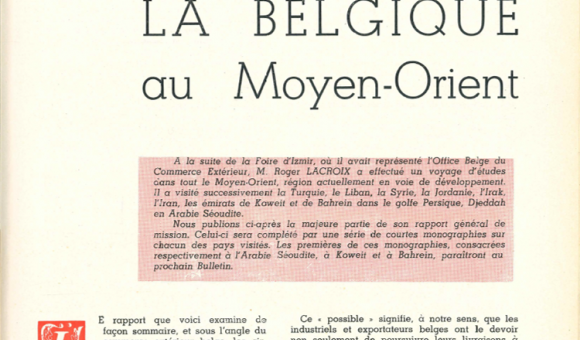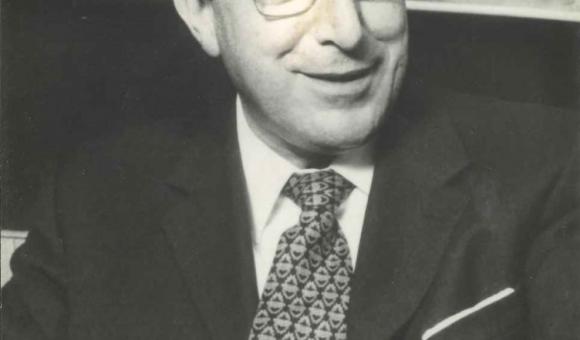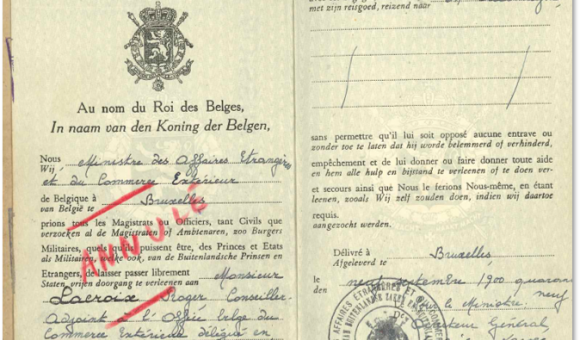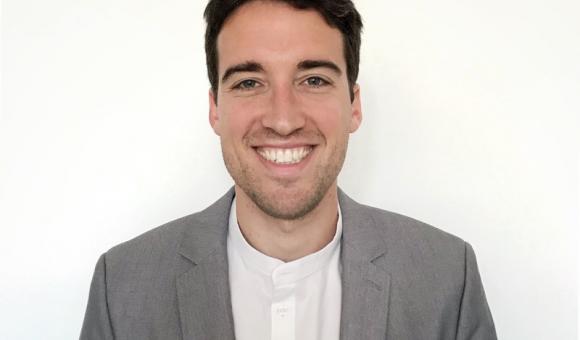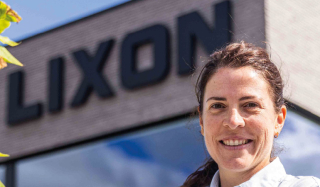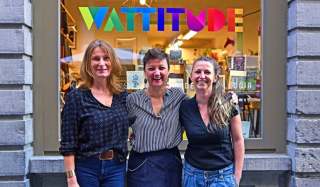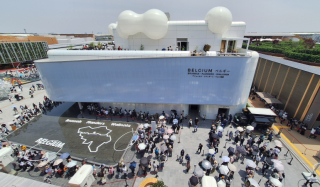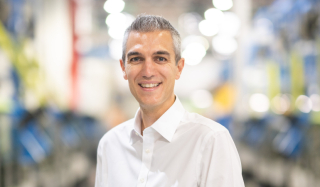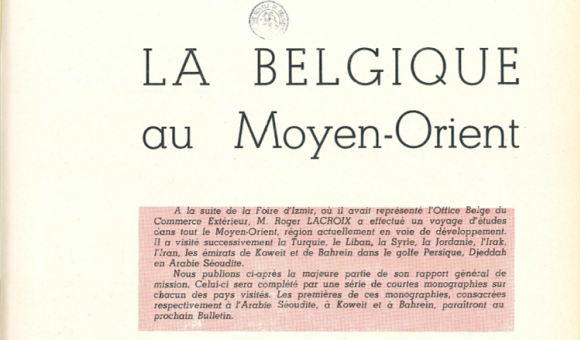
Riyadh welcomes you Mr Lacroix! The same greeting, the same family, but 70 years and 2 generations separate the arrival of Roger Lacroix, a Belgian official working in foreign trade in the Kingdom, and that of his grandson Adrien Lacroix who is also a Belgian official working in international trade and foreign investment in the Walloon Region. While for the first Lacroix, Saudi Arabia and the Middle East were more reminiscent of a thousand and one nights and the terrae incognitae (although oil exploration had already started), for the second (or rather third), the Saudi Kingdom is more synonymous with gigantism, an economic boom and opening up to the world. Two different eras, but objectives and issues that are still relevant today.
Let us tell you the story of Adrien Lacroix, an economic and commercial advisor at the Wallonia Export-Investment Agency (AWEX) and that of his grandfather Roger Lacroix, who worked on the same mission from 1950 to 1957, as an advisor to the Belgian Foreign Trade Office, the organisation in charge of Belgian foreign trade at the time.
1950 – 2020: two generations of business advisors working for Belgian companies
It's 1957. While the Soviets were sending the first artificial satellite into space, the Belgian authorities decided, through their foreign trade agency, to send Roger Lacroix on a trade exploration mission to the Middle East. As an official of the now defunct OBCE, Roger Lacroix had regularly been sent on missions abroad to attend international trade fairs, conduct market research and support Belgian delegations during their visits. This time, he took the boat to Jeddah on the Red Sea, the gateway to the Middle East.
Coincidentally, 50 years later in 2021, Adrien followed in his grandfather's footsteps and landed at Riyadh airport, in Saudi Arabia's capital, this time for the Wallonia Export-Investment Agency. Same region, same missions. "My missions for the Wallonia Export-Investment Agency in Saudi Arabia, Oman and Yemen are twofold: I am here to help Belgian, and more importantly Walloon companies, to develop and find partners in Saudi Arabia and support them in their missions and delegations, but also to raise the awareness of local investors to the potential of the Walloon economy. In other words, my job is about improving and strengthening trade relations between the two countries," Adrien recently told Arab News. But Adrien was unaware of his grandfather's past in the region, when he first moved to Riyadh. It was one of his relatives who mentioned that Roger Lacroix had lived and worked in the Middle East.
Roger 'au pays de l'or noir'
Roger Lacroix died a long time ago, at the age of 49, when Adrien's father was just nine years old, so Adrien never met him in person. "I was never told anything about his previous jobs except for vague information that he was travelling, that he was involved in business and that he worked for the state as a civil servant," said Adrien. While searching for some of his grandfather's documents, Adrien found his original passport in his grandmother's belongings. This summer, Adrien visited the diplomatic archives of the Ministry of Foreign Affairs in Belgium and discovered that Roger Lacroix had been sent to conduct market research in nine Middle Eastern countries. "You have to imagine the environment in which my grandfather was travelling, the conditions in 1950. Arriving by boat in Jeddah, travelling on practically non-existent roads with only one asphalt road in the country, linking Jeddah to Mecca. To me, this was quite impressive... this prospecting and research work that he did, gathering all this information, taking pictures and travelling to all these countries at that time." It should be noted that Belgium did not have an embassy on the Arabian Peninsula in the early 1950s. But as the Kingdom grew rapidly, businessmen regularly visited the region and an embassy was soon needed. The embassy opened in 1955 in Jeddah, the country's main port and economic hub. "Due to Roger Lacroix's contribution, the Belgian state decided that a physical presence in Saudi Arabia was crucial, especially to help our companies bid on projects, maintain closer ties with business partners and showcase Belgium's talent, economy and products." says Adrien.
In fact, in order to achieve this, the Belgian authorities relied on a decisive study that his grandfather had produced on returning to his homeland. It was also one of the documents that Adrien found during his research: Roger's study on Saudi Arabia: "The West's View: Saudi Arabia in the 1950s".
With very little known about Saudi Arabia at the time, the elder Lacroix analysed it in detail for the Belgian state. The text offers a view into the Saudi Arabia of the time. It reports on the geographical, economic and social situation of the country from the point of view of a Belgian government representative who wanted to improve trade with the Kingdom. The country was booming during the reign of King Abdulaziz, almost fifteen years after the discovery of oil. The paper describes the major projects underway in the Kingdom at the time, mainly financed by royalties from oil exploitation. The construction of an oil pipeline to the Mediterranean, jetties at the ports of Jeddah and Dammam, and the planning of a major road network connecting Saudi Arabia to all the centres of the Arabian Peninsula are all examples of the economic development that the country experienced as a result of the oil revenues.
Riyadh where it all happens
Saudi Arabia, which derived most of its revenue from pilgrims' visits (at the time, about 150,000 pilgrims visited Mecca each year) before it discovered and exploited its oil fields, has become a highly coveted trading partner and investment ground for the West. At the time that Roger Lacroix's study was being distributed in Belgian industrial circles, Riyadh had a population of 50,000 and the Bedouin population dominated the country. Saudis were mainly interested in popular food products such as butter or canned fruits and vegetables. As a symbol of the country's new openness, Jeddah had just torn down its walls to make way for new sheds, warehouses and private residences. Roger Lacroix aptly concludes in his study: "Saudi Arabia, which has long been closed to Western civilization, is giving us our chance. It's up to us to seize it."
"What is interesting about this 1950 study is how some of the findings are still very relevant today," Adrien notes. Roger Lacroix stressed in his study that Belgian entrepreneurs had to have a strong presence in the Kingdom and the Middle East and to visit physically because Saudis and businessmen from all over the subcontinent needed to see them in person. "You couldn't just send an offer by post, and that's still very true today. "Saudi business partners need to see you, talk to you and maintain the link with their Belgian counterpart because culturally, interpersonal relationships are crucial in Saudi Arabia," says Adrien.
Roger Lacroix mentioned in particular that the products offered by Belgian companies (construction & railway equipment from cement, iron, steel, etc.) were a perfect fit for the development of the Saudi economy at the time. Since Saudi Arabia was developing quickly due to the growth of the oil and gas industry, it had a logical need for these construction products and transport equipment. Today, the needs are still enormous, but it is other geographical areas that have become Saudi Arabia's main customers in these sectors. Belgium now exports mainly chemical and pharmaceutical products, such as vaccines.
The grandson wishes his grandfather was still alive so that he could chat about what he did and his impressions of Saudi Arabia. "I would love to show him how much the country has changed. I think that's something you wouldn't have expected at the time. It's quite incredible and so exciting to be a part of that change now. I would also like him to find out about my work. I think about him a lot."
Regarding the Saudi business community, Adrien advises Saudi investors that if they are looking for innovative solutions abroad, they should consider other suppliers. "Although largely unknown to the general public, Belgium is a world-class champion in sectors in line with the Kingdom's Vision 2030 such as healthcare, hydrogen, entertainment, mechanical engineering, food and beverages or logistics. It is my job and my pleasure to put the right people in contact with each other so that together they can achieve wonders."
Adrien concludes: "It is no coincidence that the famous Arab proverb "unity is power" is similar to the Belgian saying "l'union fait la force" (unity makes strength).
